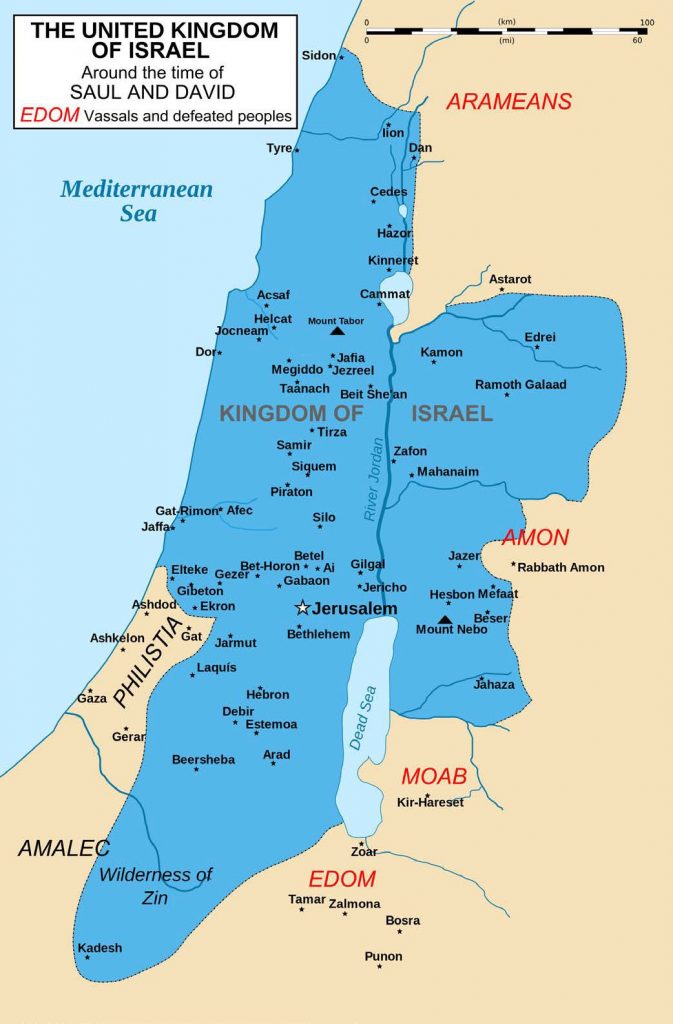The United Kingdom of Israel
The United Kingdom of Israel

After Exodus, the Israelites resettled in Canaan and in time began to unify. They formed kingdoms in the Levant just prior to 1000 BCE. King Saul (c. 1030 – 1009 BCE), a member of one of the Twelve Tribes of Israel, established the first Israelite monarchy, but ruled over a fairly limited territory and died in battle with the Philistines. He was crowned king and began the process of unification, but did not completely defeat his enemies and finish unification before he died. His son, King David, (d. 969 BCE), is often portrayed as Israel’s greatest ruler or a model king. He established the United Kingdom of Israel, with its capital at Jerusalem. King David’s successor, his son Solomon, further shaped the kingdom.
In popular memory, King David is probably most remembered for defeating Goliath. Historical traditions also celebrate him for expanding the borders of a newly unified Israel, contributing to the Book of Psalms, and, in Christian tradition, for being a forbear of Jesus. David was a “warrior king,” who defeated both internal and external enemies to unite Israel. He maintained a large standing army that helped extend his influence and create neighboring tributary states. With control of trade routes and tribute coming in from neighboring territories, Israel became a wealthy state under David. With this wealth, David began to build Jerusalem into the capital city of the Israelites, with further plans to build a temple to house the Ark of the Covenant (which according to Hebrew tradition held the Ten Commandments). David died before building this temple, but tradition credits him with other achievements, including composing many of the hymns and prayers in the Book of Psalms. Like Abraham, David is considered an important figure by Jews, Christians, and Muslims.
King Solomon, David’s son, ruled a mostly peaceful realm. He accomplished his father’s goal of building the first Jewish temple in Jerusalem. The temple exemplified monumental architecture and became a focal point for the Jews of Jerusalem. Its ruins, known as the Western Wall or the Wailing Wall, are still a site of Jewish prayer and pilgrimage. Solomon also directed the building of a royal palace, a defensive wall around the city of Jerusalem, and fortresses along the kingdom’s frontier. Administratively, Solomon set up twelve districts, overseen by purveyors, who collected tribute in kind (usually as crops or foodstuffs). Each of the twelve districts was charged with supplying the king and the court for one month a year. Finally, Solomon used treaties and reciprocal trade agreements to maintain relatively peaceful relationships with Israel’s neighbors. He also forged diplomatic relations through marriage; according to scripture, he had 700 wives! After Solomon’s death, what had been the United Kingdom of Israel split into two pieces: Israel and Judah. Over the long term, some of Solomon’s policies, including forced labor and tributary payments, likely contributed to the divide.
After the decline of the United Kingdom of Israel, Hebrew tradition describes the significance of great prophets or teachers, who spoke on behalf of god and set moral and ethical standards for the whole community. Yahweh sent these prophets to warn the Israelites that they were not abiding by their covenant. The prophets during this later period, especially Jeremiah and Second Isaiah, cultivated a new conceptualization of the covenant, which was much more personal as it was a relationship between Yahweh and each individual.
The Assyrians and later the Greeks and then the Romans brought parts of the former United Kingdom of Israel under their rule. These conquests and persecution forced members of the Jewish population into exile. This conceptualization of being members of a diaspora, that is, a scattered people who desire to return to their homeland, has played an important part in the formation of a Jewish identity. Also, in part, due to this history, preservation of cultural and religious heritage has become an enduring objective of Jews.

